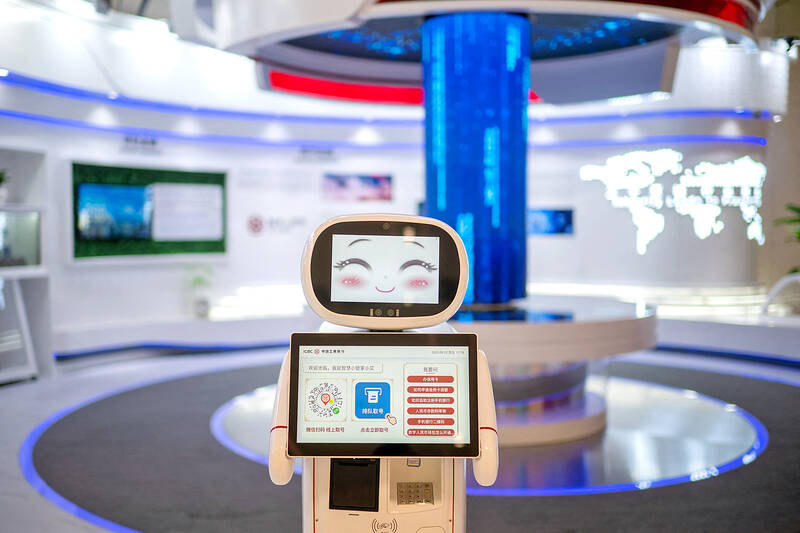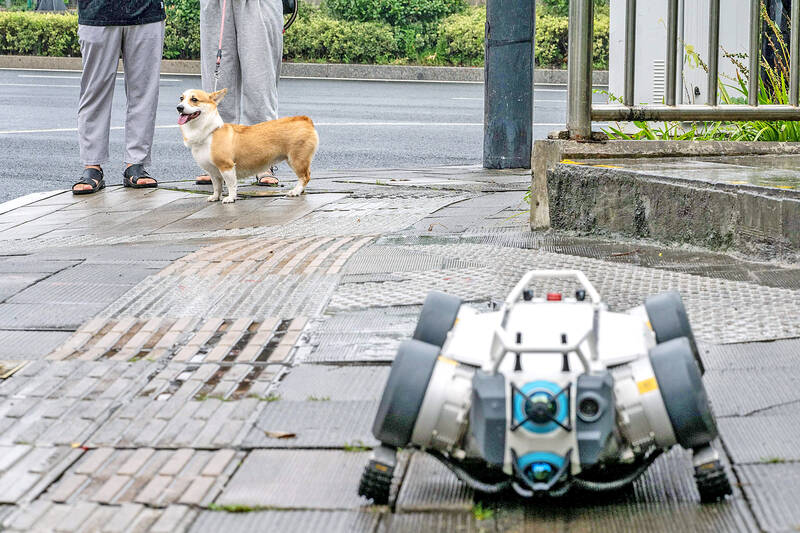From autonomous bug zappers to android pianists and driverless ice-cream trucks, machines rule the world — at least at the Asian Games in Hangzhou, China.
The Games opened yesterday after a one-year delay because of COVID-19 with about 12,000 athletes and thousands of journalists, technical officials and spectators descending on the city.
Hangzhou is the unofficial home of China’s tech industry and robots and other mind-boggling gadgets are there to serve, amuse and police visitors.

Photo: AFP
An automated mosquito trapper roams the vast Games Village, zapping the pests after luring them in by mimicking a human’s body temperature and breathing.
Robot “dogs” that can run, jump and flip over patrol power-supply facilities. Smaller versions dance while a bright-yellow android plays the piano.
Driverless minibuses shuttle visitors through the nearby city of Shaoxing, where the baseball and softball venues are.

Photo: AFP
Athletes can put their reflexes to the test against a table-tennis playing Pongbot.
At the massive media center, a blushing plastic-and-metal receptionist with a number pad and card slots built into its torso greets customers at a makeshift bank.
Even venues were built with the help of construction robots that organizers say are “very cute, with unique skills.”
Summing up how keen China is to push the theme at the Games, the mascots are three humanoid robots — Congcong, Lianlian and Chenchen, whose smiling faces adorn massive signs across Hangzhou and other nearby host cities.
Hangzhou, a city of 12 million people in China’s east, has built a reputation as a home for tech start-ups.
That includes a thriving robotics sector eager to close the gap on industry-leading rivals in countries such as the US and Japan.
At a business park, staff from DEEP Robotics put some of their most advanced models through their paces, commanding one four-legged bot to walk through construction rubble and sending another up a nearby pedestrian bridge slick with rain.
At one point, a real dog turns up and sniffs its robotic equivalent curiously.
Elsewhere, office workers pick up lunch from vending machines that maker Kuaie Fresh says can steam the food and check the temperature so the meal is just right.
The machine also collects data on customer preferences.
In some countries, that would give rise to concerns about where their personal information is going and how it would be used, but at least one customer was impressed.
“Its cooking skills are better than most people who don’t know how to cook,” 29-year-old Hu said.
A global race to push the limits of artificial intelligence (AI) brought AI-enabled humanoid robots to a UN summit in July, where they said they could eventually run society better than humans, and industrial robots have raised fears around the world that machines could make millions of jobs obsolete.
“I wouldn’t say that robots will replace humans, but rather they are a tool, and they will help humans,” DEEP Robotics executive Qian Xiaoyu (錢曉宇) said.
A temperature-taking robot had been lined up to take people’s temperatures and report if they showed signs of a fever.
I can also remind people to wear a mask, but the gadget would probably remain in its toolbox after the Chinese Communist Party abruptly lifted its “zero COVID” policy late last year.

Quanta Computer Inc (廣達) chairman Barry Lam (林百里) is expected to share his views about the artificial intelligence (AI) industry’s prospects during his speech at the company’s 37th anniversary ceremony, as AI servers have become a new growth engine for the equipment manufacturing service provider. Lam’s speech is much anticipated, as Quanta has risen as one of the world’s major AI server suppliers. The company reported a 30 percent year-on-year growth in consolidated revenue to NT$1.41 trillion (US$43.35 billion) last year, thanks to fast-growing demand for servers, especially those with AI capabilities. The company told investors in November last year that

Intel Corp has named Tasha Chuang (莊蓓瑜) to lead Intel Taiwan in a bid to reinforce relations between the company and its Taiwanese partners. The appointment of Chuang as general manager for Intel Taiwan takes effect on Thursday, the firm said in a statement yesterday. Chuang is to lead her team in Taiwan to pursue product development and sales growth in an effort to reinforce the company’s ties with its partners and clients, Intel said. Chuang was previously in charge of managing Intel’s ties with leading Taiwanese PC brand Asustek Computer Inc (華碩), which included helping Asustek strengthen its global businesses, the company

Taiwanese suppliers to Taiwan Semiconductor Manufacturing Co. (TSMC, 台積電) are expected to follow the contract chipmaker’s step to invest in the US, but their relocation may be seven to eight years away, Minister of Economic Affairs J.W. Kuo (郭智輝) said yesterday. When asked by opposition Chinese Nationalist Party (KMT) Legislator Niu Hsu-ting (牛煦庭) in the legislature about growing concerns that TSMC’s huge investments in the US will prompt its suppliers to follow suit, Kuo said based on the chipmaker’s current limited production volume, it is unlikely to lead its supply chain to go there for now. “Unless TSMC completes its planned six

Power supply and electronic components maker Delta Electronics Inc (台達電) yesterday said it plans to ship its new 1 megawatt charging systems for electric trucks and buses in the first half of next year at the earliest. The new charging piles, which deliver up to 1 megawatt of charging power, are designed for heavy-duty electric vehicles, and support a maximum current of 1,500 amperes and output of 1,250 volts, Delta said in a news release. “If everything goes smoothly, we could begin shipping those new charging systems as early as in the first half of next year,” a company official said. The new